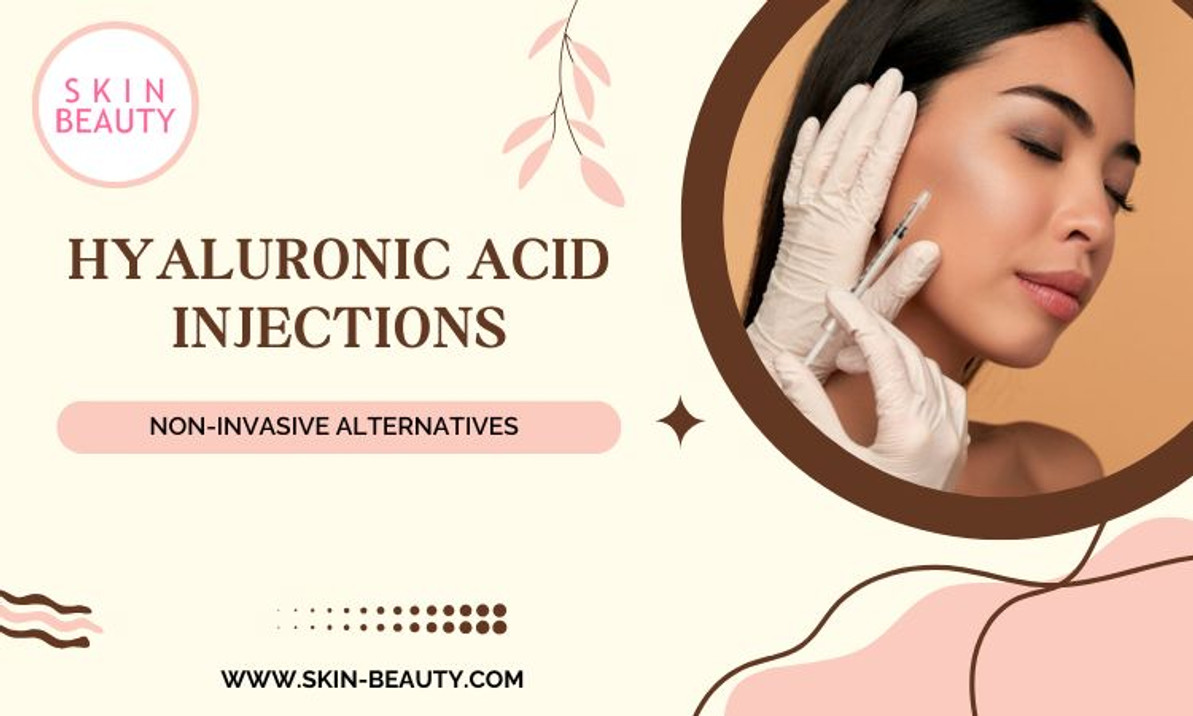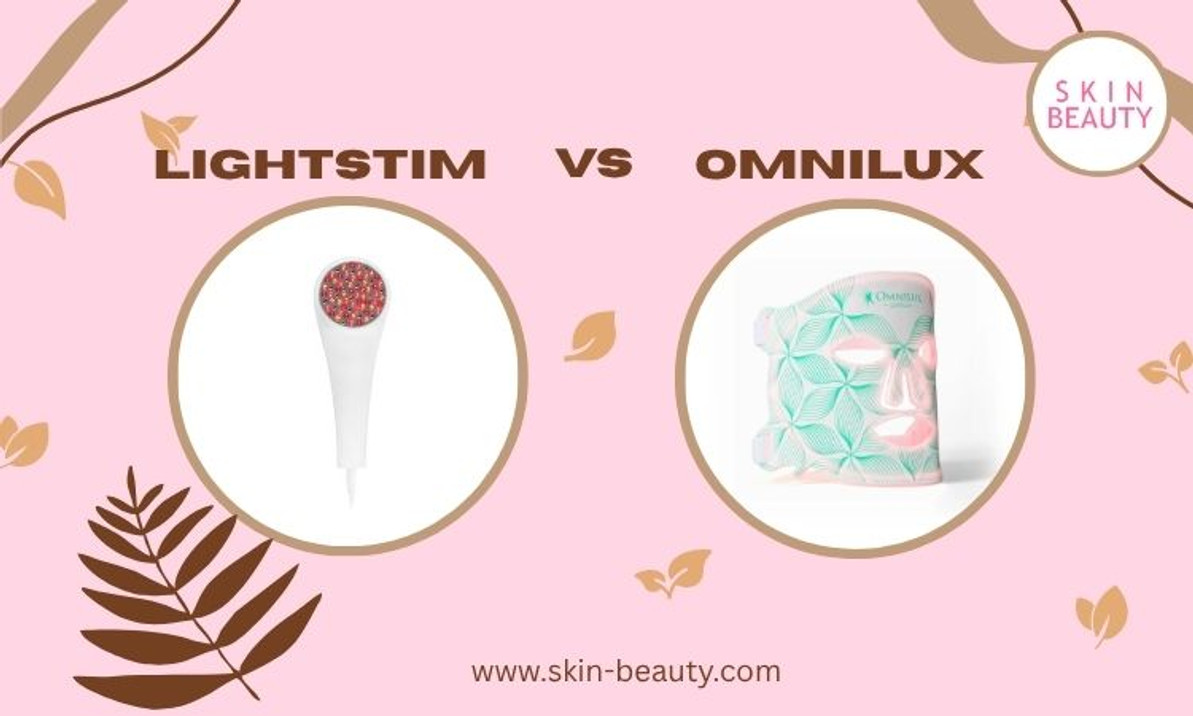How to Remove Acne Scars Naturally in a Week
How to Remove Acne Scars Naturally in a Week: Effective Home Remedies
Are you tired of acne scars stealing your confidence and affecting your social life? Worry no more! We have discovered effective home remedies, daily skincare routines, and dietary changes that can help you learn how to remove acne scars naturally in a week. Join us on this journey to regain your radiant skin and say goodbye to stubborn acne scars.
In this enlightening blog post, we will explore natural remedies, daily skincare tips, dietary changes, and preventive measures to help you achieve that clear and flawless complexion you’ve always desired. Let’s embark on this life-changing adventure to regain your self-esteem and enhance your skin’s appearance by understanding how to remove acne scars naturally in a week.
Key Takeaways
- Reduce acne scars naturally with home remedies such as aloe vera gel, lemon juice and honey & turmeric.
- Develop a daily skincare routine of gentle cleansing, exfoliation and moisturizing for healthy skin.
- Make dietary changes to increase vitamins A, C & E. Reduce sugar & dairy intake, stay hydrated, prevent Scarring by avoiding picking or squeezing acne.
Quick Home Remedies for Acne Scars
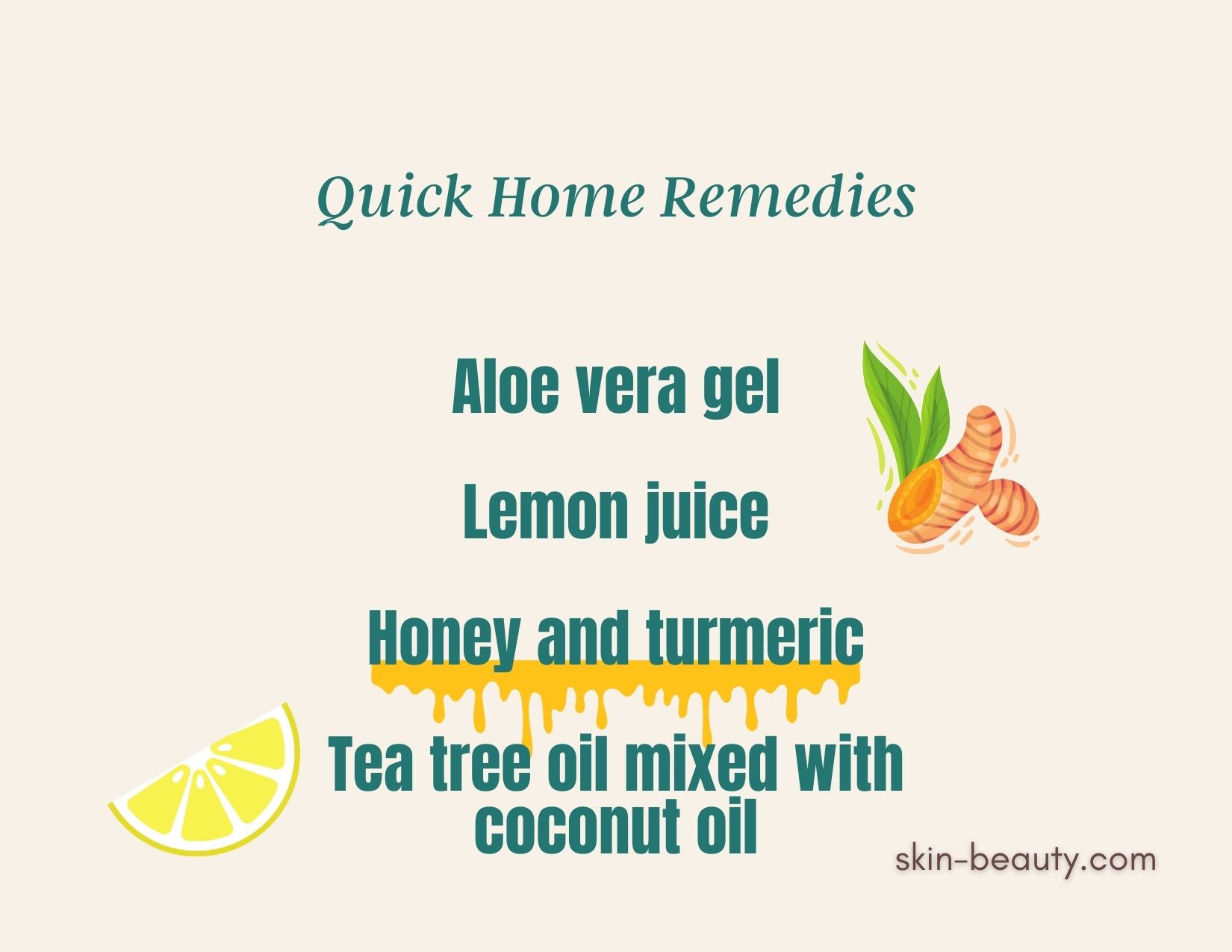
Acne scars can be stubborn and frustrating, but don’t worry! We have compiled a list of quick and effective home remedies that can help reduce acne scars naturally. These remedies include:
- Aloe vera gel
- Lemon juice
- Honey and turmeric
- Tea tree oil mixed with coconut oil
These natural ingredients, including apple cider vinegar, have proven to be highly effective in treating acne scars and promoting healthier skin.
Add these natural remedies to your skincare routine and you’ll likely see a significant improvement in your skin’s texture and appearance within a week. These home remedies are not only affordable but also safe and easy to use.
Let’s explore each remedy and understand their role in achieving clearer skin.
Aloe Vera Gel
Aloe vera gel is a miracle worker when it comes to reducing acne scars. This natural ingredient is packed with anti-inflammatory and wound healing properties that can help diminish hyperpigmentation and inflammation, encouraging the healing of acne scars. Furthermore, a blend of aloe vera, tea tree oil, and propolis has been found to be extremely efficient in minimizing acne scars and pimple marks. This combination works wonders on skin issues..
Here are the steps to use aloe vera gel effectively for reducing acne scars:
- Cleanse your skin with a gentle cleanser and warm water.
- Apply a thin layer of aloe vera gel to the affected area.
- Leave the gel on overnight, and in the morning, wash off the gel with water to soothe irritation.
- With consistent use, you can expect to see noticeable improvements in your acne scars within 1-2 weeks.
Lemon Juice
Lemon juice is another fantastic home remedy to lighten acne scars and improve skin texture. It is:
- Rich in vitamin C, citric acid, and alpha-hydroxy acid
- Nourishes damaged cells
- Encourages cell regeneration
- Brightens the skin, thus lightening scars
To apply lemon juice on acne scars, you can mix fresh lemon juice with equal parts water and use it as an astringent. Applying it two to three times per day before moisturizing can be beneficial. However, perform a patch test before applying lemon juice to your skin, particularly if it’s sensitive, to ensure safety.
Always apply sunscreen after using lemon juice to protect your skin from becoming photosensitive.
Honey and Turmeric
A mixture of honey and turmeric can work wonders in helping you remove acne scars naturally. Both ingredients are known for their anti-inflammatory and skin-lightening properties. They can help reduce inflammation and brighten the skin, which can positively contribute to the reduction of acne scars.
To harness the power of honey and turmeric, you can massage raw honey onto the impacted areas of the skin daily for a positive effect. Alternatively, you can try a yogurt and honey mask as a natural remedy for reducing redness and inflammation associated with acne.
Tea Tree Oil and Coconut Oil
Tea tree oil and coconut oil are an impressive duo for tackling acne scars. These natural ingredients have:
- Antimicrobial properties that can help reduce acne lesions
- Anti-inflammatory properties that can prevent scarring
- Coconut oil can also brighten and improve the appearance of acne scars.
To whip up a potent home remedy for acne scars, follow these steps:
- Blend a few drops of tea tree oil with coconut oil.
- Apply the mixture to the affected areas.
- Let it work its magic on your skin.
- With consistent use, you should see a remarkable improvement in your acne scars and overall skin health.
Daily Skincare Routine
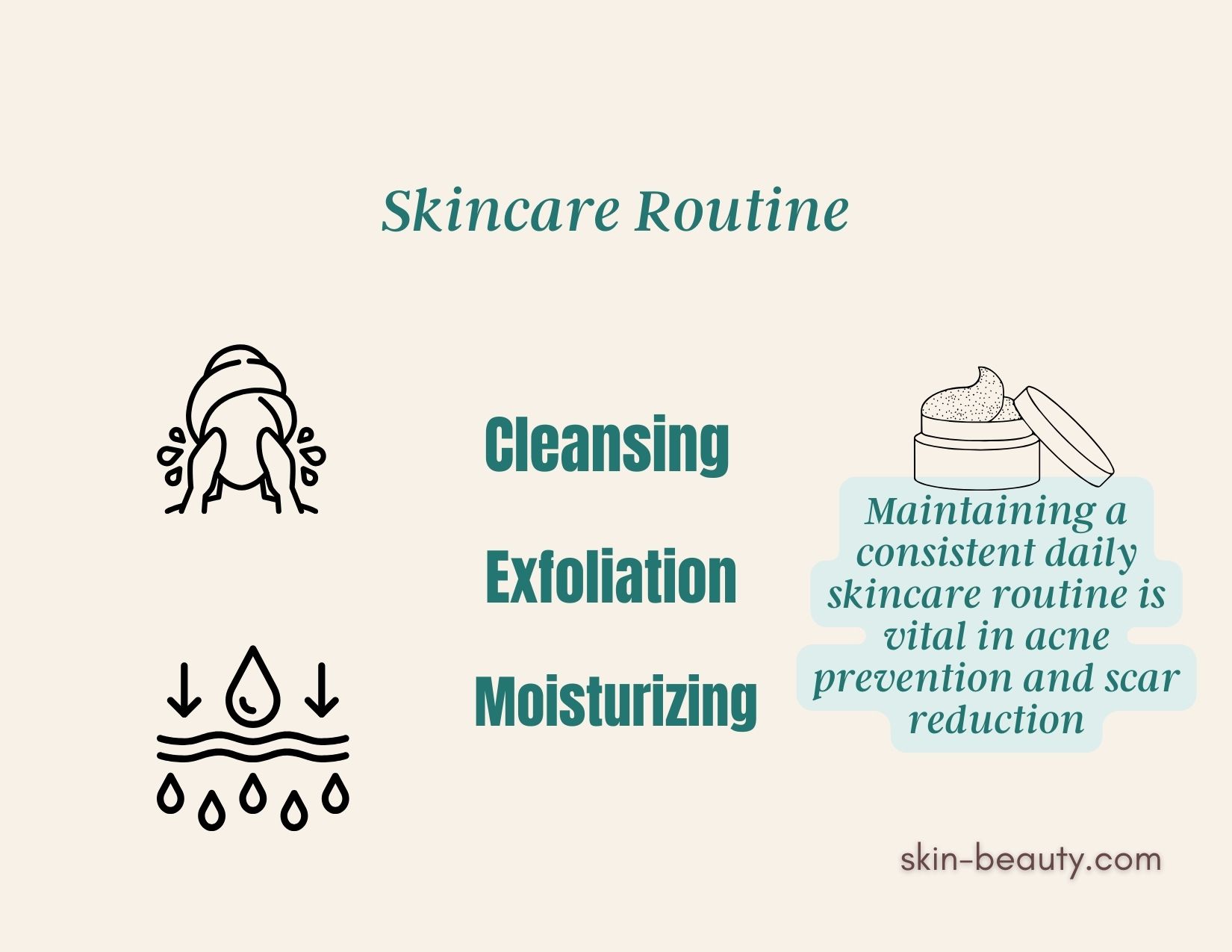
Maintaining a consistent daily skincare routine is vital in preventing acne and reducing scar visibility. By practicing proper skin care hygiene, you can help avoid acne scars in the future. Cleansing gently, exfoliating, and moisturizing are essential for a healthy daily skincare routine.
The upcoming sections will highlight the significance of each skincare step and offer practical tips for their effective inclusion. By following these simple yet effective steps, you can achieve a clear, radiant, and acne-free complexion.
Gentle Cleansing
Gentle cleansing is a fundamental step in maintaining healthy skin and preventing acne breakouts, especially for those with sensitive skin. By clearing away dirt, oil, and bacteria from the skin, gentle cleansing promotes a healthy complexion and prevents acne breakouts. Some of the best gentle cleansers for acne-prone skin include:
- Neutrogena Oil-Free Salicylic-Acid Acne-Fighting Face Wash
- EltaMD Foaming Cleanser
- CeraVe Acne Foaming Cream Cleanser
- Honest Beauty Get Clarity Foaming Acne Cleanser
Ideally, wash your face twice daily with lukewarm water using a gentle cleanser that contains benzoyl peroxide or salicylic acid for the best results. This will help protect your skin’s protective barrier and ensure your pores are closed after rinsing with cold water.
Exfoliation
Exfoliation is an essential step in any skincare routine, as it helps remove dead skin cells and promote cell turnover, reducing the appearance of acne scars. BHAs (beta hydroxy acids) are great for unclogging pores and reducing inflammation. It’s important to be mindful and use gentle chemical exfoliators.
Depending on your skin type, it is recommended to exfoliate your skin 1-3 times per week to keep your skin looking healthy and clear. Incorporating exfoliation into your skincare routine will help you attain a smoother, more radiant complexion, devoid of acne scars and blemishes.
Moisturizing
Moisturizing is an indispensable step in maintaining healthy skin and preventing acne breakouts. It helps preserve the skin’s natural barrier, which can help prevent acne and even improve the appearance of existing scars. Some of the best moisturizers for acne-prone skin include CeraVe PM Facial Moisturizing Lotion, Neutrogena Hydro Boost Hyaluronic Acid Hydrating Water Gel, and Murad Skin Perfecting Lotion, which are lightweight, oil-free, and deeply hydrate the skin without clogging pores.
For best results, follow these steps in your skincare routine:
- Cleanse your skin to remove dirt and impurities.
- Exfoliate to remove dead skin cells and unclog pores.
- Apply a moisturizer to maintain your skin’s natural barrier and prevent acne breakouts.
Regularly including moisturizing in your daily skincare routine can promote a healthy, smooth, and glowing complexion.
Dietary Changes for Clear Skin
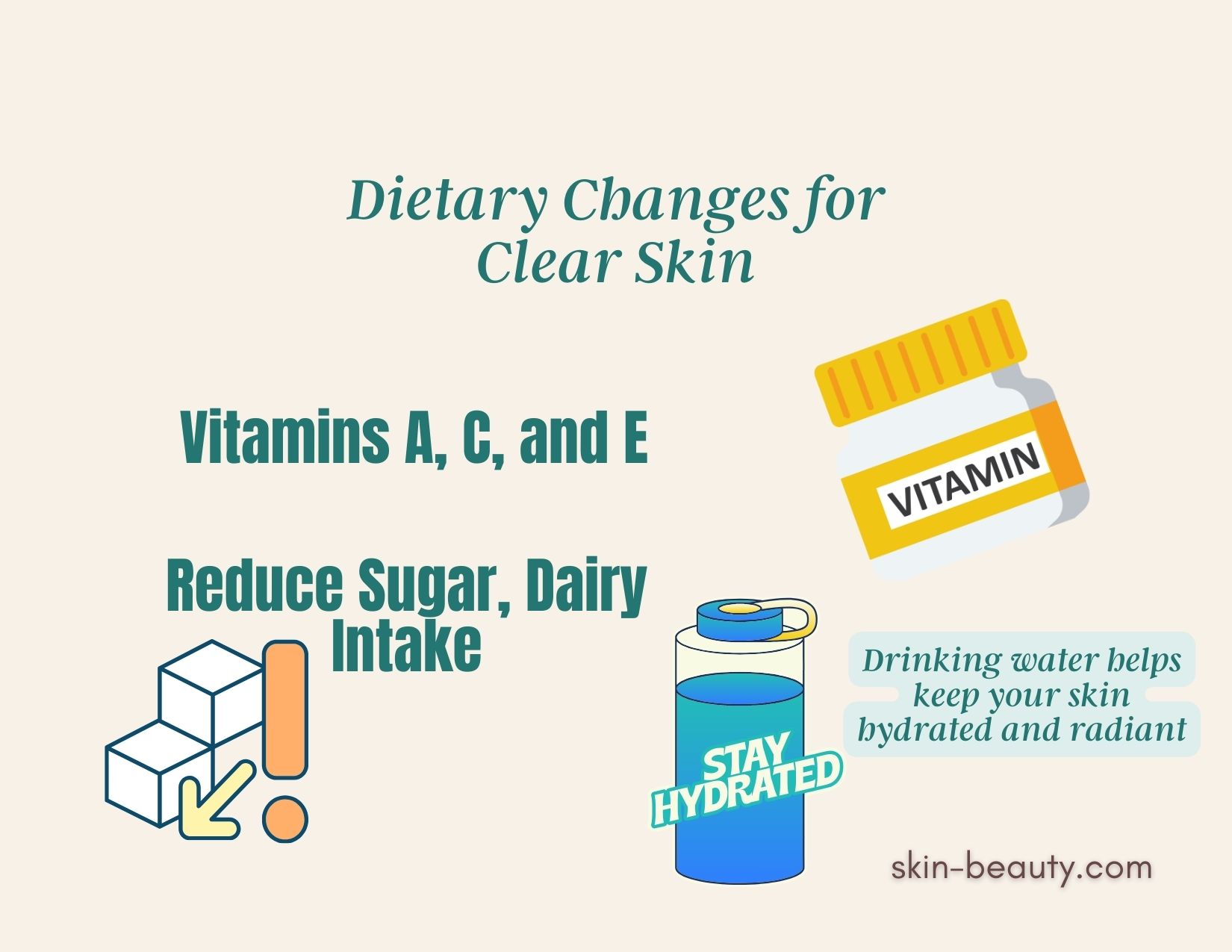
Diet plays a significant role in maintaining clear skin and reducing the appearance of acne scars. By consuming foods rich in vitamins A, C, and E, staying hydrated, and reducing sugar and dairy intake, you can achieve clearer and healthier skin.
The upcoming sections will delve into the benefits of particular dietary changes and offer practical tips for their inclusion in your daily life. By adopting these changes, you can expect to see noticeable improvements in your skin’s texture, tone, and overall appearance.
Foods Rich in Vitamins A, C, and E
Foods rich in vitamins A, C, and E can help promote healthy skin and reduce the appearance of acne scars. Here are some examples:
- Vitamin A: promotes cell turnover and reduces inflammation
- Vitamin C: stimulates collagen production, reduces hyperpigmentation, and smooths wrinkles
- Vitamin E: protects the skin from free radical damage and can help reduce the visibility of scars.
Some excellent sources of vitamin A include beef liver, cod liver oil, herring, sweet potato, carrots, spinach, and kale. Foods high in vitamin C, such as citrus fruits, strawberries, and bell peppers, can help brighten the skin and improve its texture. Nourishing foods packed with vitamin E include wheat germ oil, sunflower seeds, almonds, pine nuts, avocado, peanut butter, fish, and red peppers.
Hydration
Hydration is essential for maintaining healthy skin and preventing acne breakouts. Drinking enough water helps keep your skin hydrated and radiant. Proper hydration also strengthens your immune system, fights off infections, and promotes healthy skin hydration.
The recommended daily water intake for optimal skin health is generally between 5 and 8 glasses of water per day. Drinking water certainly has the potential to help improve acne scars by promoting skin hydration and flushing out toxins from the body. In addition to water, drinks like green tea can help reduce acne and improve skin health due to their antioxidant properties.
Reducing Sugar and Dairy Intake
Reducing sugar and dairy intake can help control acne and promote clearer skin. Consuming too much sugar and dairy can lead to increased inflammation and hormone levels, which can contribute to acne breakouts.
To reduce sugar and dairy intake, it is important to emphasize eating whole foods, such as fruits, vegetables, and lean proteins. Additionally, it is beneficial to limit processed foods and drinks, as well as foods high in sugar and dairy.
Furthermore, it is essential to drink plenty of water and get adequate sleep to maintain healthy skin and prevent acne breakouts.
Preventing Further Acne Scars
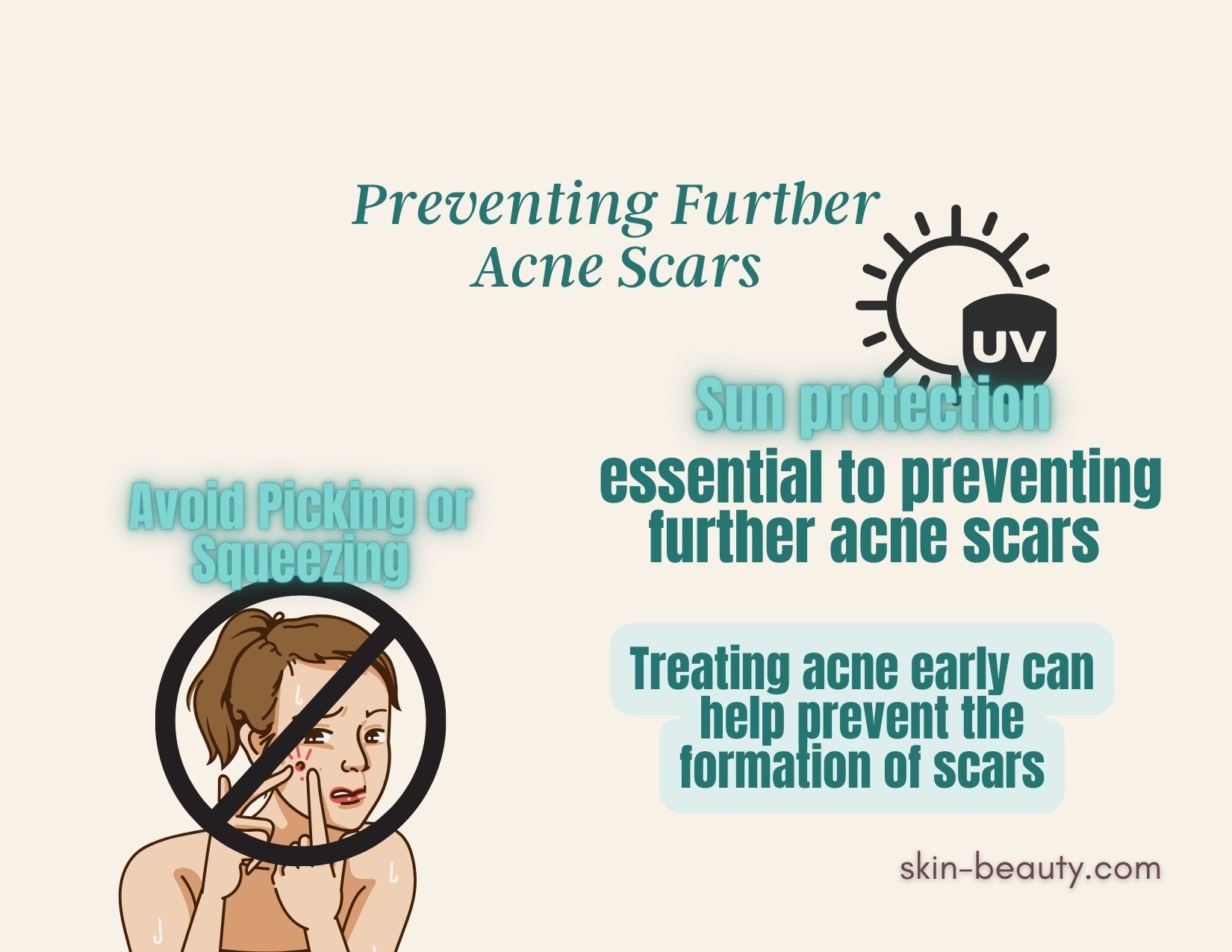
Preventing further acne scars is essential for achieving and maintaining clear skin. By avoiding picking or squeezing acne, using sun protection, and treating acne early, you can prevent the formation of scars and promote clearer skin.
In the sections ahead, we’ll cover the significance of these preventive strategies and offer handy tips for their effective implementation. By following these simple yet effective steps, you can achieve a clear, radiant, and acne-free complexion.
Avoid Picking or Squeezing
Resisting the urge to pick or squeeze acne can be challenging, but it’s crucial for preventing further scarring and inflammation. Picking or squeezing acne can damage the skin, leading to the formation of scars and promoting inflammation.
For instant relief and to prevent picking or squeezing acne, consider these alternatives:
- Apply aloe vera or honey for natural treatments
- Try spot treatments like benzoyl peroxide or salicylic acid
- Use acne patches or hydrocolloid bandages for targeted areas
- Avoid picking or squeezing by cleaning the area and applying ice or natural treatments.
By avoiding picking or squeezing, you can maintain your skin’s integrity and prevent further scarring.
Sun Protection
Sun protection is an essential aspect of preventing further acne scars. It can help reduce hyperpigmentation and promote the healing of acne scars. Sun exposure can have both positive and negative effects on acne and acne scars. While it can help reduce inflammation and redness, it is crucial to protect your skin from the sun to prevent any negative effects that may occur from over-exposure.
To shield your skin from the sun effectively, follow these tips:
- Use sunscreen with an SPF of 30 or higher every two hours, particularly when outdoors.
- In addition to sunscreen, you can also use coconut oil and aloe vera to provide extra protection.
- Wear protective clothing, such as hats and long-sleeved shirts, to shield your skin from harmful UV rays.
Treat Acne Early
Treating acne early can help prevent the formation of scars and promote clearer skin. By addressing acne as soon as it appears, you can minimize the risk of scarring and other skin damage.
Some effective treatments for early-stage acne include tetracycline or macrolide antibiotics, retinoids with benzoyl peroxide, azelaic acid, salicylic acid, and topical antibiotics. For severe acne, steroid injections and laser therapy are also available. Early acne treatment can help you attain a clear, radiant, and acne-free complexion.
When to Seek Professional Help
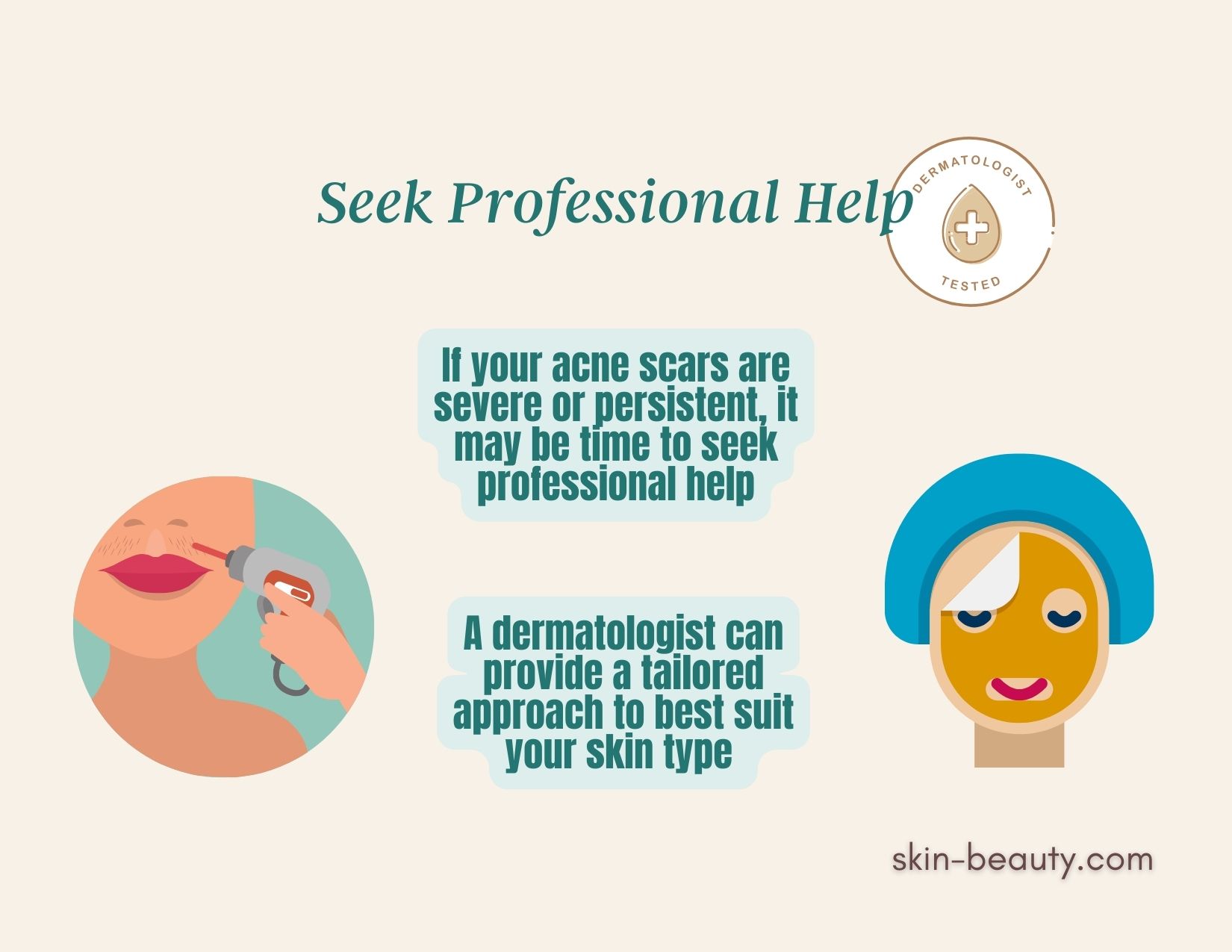
If your acne scars are severe or persistent, it may be time to seek professional help. A dermatologist can provide a tailored approach to best suit your skin type and the extent of the scarring, potentially leading to successful outcomes. Dermatological treatments such as:
- Injections of corticosteroids
- Laser therapy
- Chemical peels
- Microneedling
This treatment can help get rid of acne and fade acne scars, including atrophic scars, hypertrophic scars, icepick scars, keloid scars, and pimple scars, while also helping you get rid of acne scars.
Don’t hesitate to consult a dermatologist if you’re struggling with severe or persistent acne scarring. With the right guidance and treatment, you can achieve clearer skin and regain your confidence.
Summary
In summary, removing acne scars naturally in a week is possible by incorporating effective home remedies, maintaining a daily skincare routine, adopting healthy dietary changes, and taking preventive measures. By following these practical tips and staying consistent, you can achieve a clear, radiant, and acne-free complexion.
Remember, your skin is unique, and patience is key. Embrace these tips and embark on the journey towards regaining your self-esteem and enhancing your skin’s appearance. With persistence and dedication, you can say goodbye to stubborn acne scars and hello to a more confident you.
Frequently Asked Questions
What is the fastest way to remove acne scars?
The fastest way to remove acne scars is to use advanced technology treatments, such as laser and light treatments. These methods are generally the most effective for treating moderate to severe acne scars.
Can acne scars fade in a week?
Although acne scars will not fade in a week, they can become less noticeable with various treatments and often lighten naturally in several months. With patience and time, significant improvements in your appearance are possible.
How long does it take for aloe vera gel to reduce acne scars?
With regular use, aloe vera gel can reduce acne scars in as little as 1-2 weeks.
How often can you exfoliate to reduce acne scars?
Exfoliating two to three times a week is an effective way to reduce acne scars.
What is the recommended daily water intake for optimal skin health?
For optimal skin health, you should aim for at least 5 to 8 glasses of water per day.
Recent Posts
-
Hyaluronic Acid Injections
Hyaluronic Acid Injections: What to Know & Non-Invasive Alternatives That Actually Work In the p …Jun 17th 2025 -
Kojic Acid Creams
My Kojic Acid Journey: How One Ingredient Transformed My Skin (And the Best Kojic Acid Creams to Try …Jun 11th 2025 -
LightStim vs. Omnilux
LightStim vs. Omnilux: My Real LED Skincare Results & Which One I Recommend LED light therapy&nb …Jun 3rd 2025


